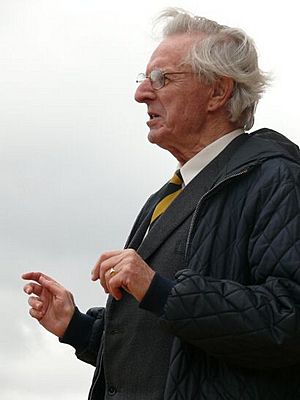Arnold Wolfendale facts for kids
Quick facts for kids
Sir Arnold Wolfendale
|
|
|---|---|
 |
|
| Born | June 25, 1927 Rugby, Warwickshire, England, United Kingdom
|
| Died | December 21, 2020 (aged 93) Durham, County Durham, England
|
| Nationality | British |
| Alma mater | University of Manchester |
| Known for | Astronomer Royal Cosmic rays |
| Spouse(s) |
Audrey Darby
(m. 1951–2007)Dorothy Middleton
(m. 2015) |
| Awards | Fellow of the Royal Society (1977) Marian Smoluchowski Medal (1992) Knight Bachelor (1995) FInstP FRAS |
| Scientific career | |
| Fields | Physics |
| Institutions | University of Manchester Durham University University of Ceylon University of Hong Kong |
| Thesis | The nuclear interactions of mu-mesons (1953) |
| Doctoral students | George Efstathiou |
Sir Arnold Whittaker Wolfendale (born June 25, 1927 – died December 21, 2020) was a famous British astronomer. He held the important title of Astronomer Royal from 1991 to 1995. This role is a special honor given to a leading astronomer in the United Kingdom.
Sir Arnold was also a professor of physics at Durham University. He led the European Physical Society from 1999 to 2001. He also served as President of the Royal Astronomical Society from 1981 to 1983.
Contents
About Sir Arnold Wolfendale
Sir Arnold Wolfendale was a brilliant scientist who spent his life studying the universe. He was especially known for his work on Cosmic rays. These are tiny, high-energy particles that travel through space.
Early Life and Education
Arnold Wolfendale was born in Rugby, Warwickshire, England. He grew up with a keen interest in science. He went on to study at the University of Manchester. There, he earned his degree in physics.
His early research focused on understanding cosmic rays. He completed his PhD in 1953. His studies helped us learn more about these mysterious particles.
Researching Cosmic Rays
Sir Arnold's main work involved studying cosmic rays. These rays come from outer space and hit Earth's atmosphere. Scientists like Wolfendale wanted to know where they come from. They also wanted to understand what they are made of.
He used special equipment to detect and measure these rays. His research helped to explain how cosmic rays behave. It also showed how they interact with matter. This work was very important for understanding our galaxy.
Becoming Astronomer Royal
In 1991, Sir Arnold Wolfendale was given a great honor. He was appointed the Astronomer Royal. This is a very old and respected position in the UK. It means he was the Queen's official astronomer.
He held this title for four years, until 1995. During this time, he helped promote astronomy. He also advised the government on scientific matters.
Leadership in Science
Beyond his research, Sir Arnold was a leader in the scientific community. He was a professor at Durham University for many years. He helped teach and inspire new generations of scientists.
He also led important scientific groups. He was President of the Royal Astronomical Society. He also served as President of the European Physical Society. These roles showed his dedication to science.
Awards and Recognition
Sir Arnold Wolfendale received many awards for his contributions. In 1977, he became a Fellow of the Royal Society. This is a very high honor for scientists in the UK.
He was also knighted in 1995, becoming "Sir Arnold." This recognized his outstanding work. He received the Marian Smoluchowski Medal in 1992. This award is given for achievements in physics.
His work helped us better understand the universe. He made a lasting impact on the field of astronomy.
 | William M. Jackson |
 | Juan E. Gilbert |
 | Neil deGrasse Tyson |

